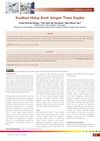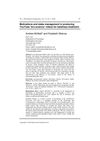 10 citations,
January 2019 in “Biomarker Insights”
10 citations,
January 2019 in “Biomarker Insights” Scalp cooling to prevent hair loss from chemotherapy works for some but not all, and studying hair damage markers could improve prevention and treatment.
[object Object]  6 citations,
September 2005 in “Expert Opinion on Pharmacotherapy”
6 citations,
September 2005 in “Expert Opinion on Pharmacotherapy” Androgen therapy can help with symptoms like low libido in women, but more research is needed to understand its long-term safety and effects on health.
 2 citations,
January 2019 in “International Journal of Medicine in Developing Countries”
2 citations,
January 2019 in “International Journal of Medicine in Developing Countries” Telogen Effluvium is a common hair loss condition, particularly in women, with no specific FDA-approved treatment, and recovery can take up to 18 months.
 February 2024 in “Brazilian Journal of Implantology and Health Sciences”
February 2024 in “Brazilian Journal of Implantology and Health Sciences” PCOS often causes skin issues like excess hair, acne, and hair loss, needing early treatment.
 November 2023 in “Cermin Dunia Kedokteran”
November 2023 in “Cermin Dunia Kedokteran” Tinea capitis can affect mental health, but treatment improves both health and well-being.
 January 2017 in “Acta dermato-venereologica”
January 2017 in “Acta dermato-venereologica” The congress showed that psychological therapy can help skin condition patients, social media affects acne stigma, education improves atopic dermatitis, and patient satisfaction in dermatology is high, especially with good doctor engagement.
 April 2016 in “Journal of Aesthetic Nursing”
April 2016 in “Journal of Aesthetic Nursing” Men are increasingly removing body hair for looks and cleanliness, and while hair loss can cause distress, it doesn't affect their self-esteem as much as it does in women.
 192 citations,
June 1992 in “Journal of The American Academy of Dermatology”
192 citations,
June 1992 in “Journal of The American Academy of Dermatology” Hair loss can cause low self-esteem, anxiety, and depression in men.
[object Object]  101 citations,
January 2012 in “Annals of Dermatology”
101 citations,
January 2012 in “Annals of Dermatology” Men with hair loss experience lower quality of life, worsened by factors like age, severity, and treatment history.
 69 citations,
April 2017 in “BMJ open”
69 citations,
April 2017 in “BMJ open” Many people with alopecia experience high levels of social anxiety, anxiety, and depression, and while wigs can boost confidence, they may also cause anxiety.
 41 citations,
September 2012 in “Cellular and Molecular Life Sciences”
41 citations,
September 2012 in “Cellular and Molecular Life Sciences” MicroRNAs play a crucial role in skin and hair health, affecting everything from growth to aging, and could potentially be used in treating skin diseases.
 19 citations,
October 2011 in “Clinics in Dermatology”
19 citations,
October 2011 in “Clinics in Dermatology” New chemotherapy drugs cause skin side effects, but treatments like minocycline and tetracycline can help reduce them.
 12 citations,
May 2017 in “Medicine”
12 citations,
May 2017 in “Medicine” Oral isotretinoin was recommended for a 21-year-old woman with severe acne.
 8 citations,
January 2020 in “Plastic and Aesthetic Nursing”
8 citations,
January 2020 in “Plastic and Aesthetic Nursing” The article concludes that different types of hair loss require specific treatments and psychological support is important.
 6 citations,
November 2007 in “Archives of Disease in Childhood: Education & Practice”
6 citations,
November 2007 in “Archives of Disease in Childhood: Education & Practice” The document concludes that accurate diagnosis of alopecia in children relies on thorough examination and history, and while treatments exist, none can alter the course of alopecia areata, which can significantly affect a child's psychological well-being.
 3 citations,
November 2016 in “Clinical Pediatrics”
3 citations,
November 2016 in “Clinical Pediatrics” A girl with Crohn's disease developed hair loss from her medication, which improved with treatment but later returned.
 2 citations,
October 2018 in “Springer eBooks”
2 citations,
October 2018 in “Springer eBooks” Cancer treatments can cause skin-related side effects that may affect patient quality of life and require changes in treatment.
 1 citations,
January 2018 in “International Journal of Web Based Communities”
1 citations,
January 2018 in “International Journal of Web Based Communities” Creators of YouTube 'bro-science' baldness videos are driven by a need to share and persuade, often emphasizing authenticity and community building, while navigating trust issues related to commercial ties.
 1 citations,
January 2015 in “Journal of clinical and investigative dermatology”
1 citations,
January 2015 in “Journal of clinical and investigative dermatology” IGF-1 from human placenta helps hair grow.
 January 2024 in “Archives of pharmacy practice”
January 2024 in “Archives of pharmacy practice” The skin is vital for protection, temperature control, fluid balance, immunity, and sensing, with damage affecting daily life and mental health.
 December 2023 in “International Journal of Medical Arts”
December 2023 in “International Journal of Medical Arts” Transplanted hair follicles show significant changes after FUE, needing more research.
 January 2023 in “Archives of Disease in Childhood Education & Practice”
January 2023 in “Archives of Disease in Childhood Education & Practice” Hirsutism in teens is often due to polycystic ovarian syndrome and needs careful assessment and support.
 July 2018 in “Elsevier eBooks”
July 2018 in “Elsevier eBooks” Telogen Effluvium is a common, usually reversible hair loss condition, often improved by removing the trigger and possibly treated with various products, though their effectiveness is uncertain.

Taller men are seen as more attractive, and hair loss negatively affects attractiveness.
 January 2023 in “Skin appendage disorders”
January 2023 in “Skin appendage disorders” Laser treatment for hair loss works equally well on different skin types, but more research is needed for very dark skin.
69 citations,
May 2009 in “Journal of Investigative Dermatology” Stress might contribute to hair loss in alopecia areata.
127 citations,
August 2016 in “The oncologist” Understanding and managing side effects of hedgehog pathway inhibitors can improve treatment for advanced basal cell carcinoma.
30 citations,
January 2019 in “International Journal of Trichology” Androgenetic alopecia significantly harms quality of life, affecting emotions and relationships.
24 citations,
August 2020 in “JAMA dermatology” Persistent radiation-induced hair loss is dose-dependent, and treatments like topical minoxidil can be effective.
 31 citations,
August 2022 in “Frontiers in Oncology”
31 citations,
August 2022 in “Frontiers in Oncology” Photobiomodulation therapy helps manage cancer treatment side effects but needs more research for optimization.

























